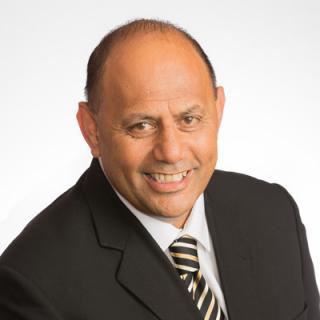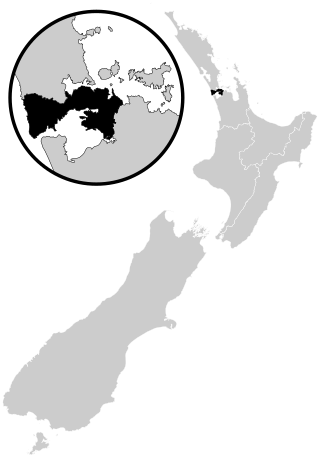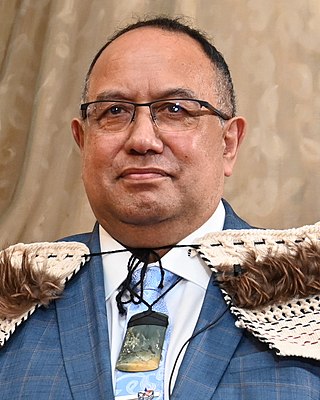Te Pāti Māori, also known as the Māori Party, is a political party in New Zealand advocating Māori rights. With the exception of a handful of general electorates, Te Pāti Māori contests the reserved Māori electorates, in which its main rival is the Labour Party.

Sir Pita Russell Sharples is a New Zealand Māori academic and politician, who was a co-leader of the Māori Party from 2004 to 2013, and a minister outside Cabinet in the National Party-led government from 2008 to 2014. He was the member of Parliament for the Tāmaki Makaurau electorate in Auckland from 2005 to 2014. He stepped down as co-leader role of the Māori Party in July 2013.

William Wakatere Jackson is a New Zealand politician and former unionist, broadcaster and Urban Māori leader. He was a Member of Parliament for the Alliance from 1999 to 2002 and is currently a Labour Party MP, having been re-elected in 2017.

Tāmaki Makaurau is a New Zealand parliamentary Māori electorate returning one Member of Parliament to the New Zealand House of Representatives. It was first formed for the 2002 election. The electorate covers central and southern Auckland, and southern parts of western Auckland. It derives its name from the Māori-language name for Auckland; Makaurau is a descriptive epithet referring to the value and desirability of the land.

Hauraki-Waikato is a New Zealand parliamentary Māori electorate first established for the 2008 election. It largely replaced the Tainui electorate. Nanaia Mahuta of the Labour Party, formerly the MP for Tainui, became MP for Hauraki-Waikato in the 2008 general election and was re-elected in 2011, 2014, 2017 and 2020.
Duncan Garner is a New Zealand broadcaster and journalist.

Seventy members of the New Zealand House of Representatives elected in the 2011 general election were from single member constituencies, the same number as in 2008. The initial composition of the 2008 Parliament gave the National Party 41 seats, the Labour Party 21, the Māori Party five and ACT, United Future and the Progressive Party one each.

Denise Adrienne Lee is a New Zealand politician who was the National Party's Member of Parliament for the Maungakiekie electorate from 2017 to 2020. She was previously an Auckland Council local body councillor.
Thomas Kavanagh Weal was a New Zealand politician for the Social Credit Political League, the New Democratic Party and the short lived Christian Democrat party.

Peeni Ereatara Gladwyn Henare is a New Zealand Labour Party politician who has been a member of the New Zealand parliament since the 2014 general election. Henare held the Tāmaki Makaurau Māori electorate since 2014 before being defeated by Te Pāti Māori's Takutai Tarsh Kemp in the 2023 general election.

Adrian Paki Rurawhe is a New Zealand Labour Party politician. He has been an MP since 2014, and the speaker of the New Zealand House of Representatives from 2022 to 2023.
Hauraki was a New Zealand parliamentary Māori electorate returning one Member of Parliament to the New Zealand House of Representatives. It existed for one parliamentary term from 1999 to 2002, and was held by John Tamihere. The electorate's area was formed from the northern portion of Te Tai Rawhiti as well as a small portion of Te Tai Hauāuru. Its area was expanded significantly westward to form the Tainui electorate for the 2002 election.

The 2020 New Zealand general election was held on Saturday 17 October 2020 to determine the composition of the 53rd New Zealand Parliament. Voters elected 120 members to the House of Representatives, 72 from single-member electorates and 48 from closed party lists. Two referendums, one on the personal use of cannabis and one on euthanasia, were also held on the same day. Official results of the election and referendums were released on 6 November.

Rachel Elizabeth Boyack-Mayer is a New Zealand unionist and politician. Since 2020, she has been a Member of Parliament for the Labour Party.

Vision NZ is a nationalist political party in New Zealand led by Hannah Tamaki, the co-leader of the fundamentalist Christian movement Destiny Church. Its policies have included opposition to abortion, homosexuality, immigration, and the construction of new mosques. It has supported creating a Māori-owned bank and Tūhoe ownership of Te Urewera, and has called for government funding for Destiny Church programmes.

The 2023 New Zealand general election was held on 14 October 2023 to determine the composition of the 54th Parliament of New Zealand. Voters elected 122 members to the unicameral New Zealand House of Representatives under the mixed-member proportional (MMP) voting system, with 71 members elected from single-member electorates and the remaining members elected from closed party lists. Of the 72 electorates, only 71 seats were filled, with the remaining electorate MP determined in the 2023 Port Waikato by-election, due to the death of one of the general election candidates. Two overhang seats were added due to Te Pāti Māori winning six electorate seats when the party vote only entitled them to four seats, with an additional overhang seat added after the by-election making for 123 members of parliament.

This page lists candidates contesting electorates in the 2020 New Zealand general election.
Hannah Tamaki JP is the wife of Brian Tamaki, the leader of the Pentecostal fundamentalist movement Destiny Church. She is also the leader of the Christian fundamentalist political party Vision NZ.

This page lists candidates contesting electorates in the 2023 New Zealand general election.

Takutai Moana Natasha Kemp is a New Zealand politician, chief executive and hiphop dance director. Kemp won the Tāmaki Makaurau electorate for the Māori Party by 42 votes in the official results of the 2023 New Zealand general election.













